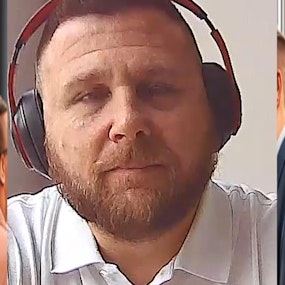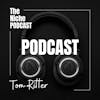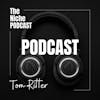Should We Hatch A Fintech Media Niche?
Nick is a founding principal at the fintech solutions provider, Chek.
He joins Tom to spit-ball some concepts around production and value-prop.
🎧 Celebrate Independence Day with your own media-independence!
Nick is a founding principal at the fintech solutions provider, Chek.
He joins Tom to spit-ball some concepts around production and value-prop. Nick already understands podcasting....
So Tom jumps directly into the wildest set of ideas, as if he's never been on a intro-call before. Feel free to do a shot every time you hear an expletive or the phrase "heavens to Betsy".
(You can't teach passion)
Passion also comes up in the convo, as it relates to your podcast host.
Custom episode art:
Create a hyper-realistic oil painting podcast cover art for a financial tech organization.
Learn about Chek: https://checkspend.com
More Niche Podcast Podcast: https://nichepodcastpodcast.com
Podcast Background | Valero Performer Greenscreen
At B&H: https://bhpho.to/3TyNp7R
On Amazon: https://amzn.to/3IOQYBF
Add Black Backdrop: https://amzn.to/4anxTCv
Podcast Websites by Podpage
Turn Your Podcast into a Website
Auphonic AI Audio Editor
Yeah, well, no, what was what was the sort of life cycle of that? I'm interested to hear how it started and how it how it ended up taking a hiatus between then and now, because that's a real probably informative thing. And this might be a great clip for somebody I send have a convo with next week, who I think, you know what, these guys think they want to podcast, but I don't think that they've struck the chord that they need. And this will fail over it or it won't sustain. I don't think it's a failure if somebody discovers it two years later. sees it and says, oh, these guys did a series on this. That's great. I think if you do three, you know, and I can't tell you how many law firm websites have three episodes on them from two years ago, that to me, I would rather take off my website. Like that
Nick Schedler:
Hmm.
Tom:
to me looks like somebody couldn't get shit done in my office. And that to me is not a marketing tool at that point. But that's not what I'm saying happened to you, but yours looked evolved. You had guests. You were doing a lot of cool things. The audio quality was good. How did it start? How did it end?
Nick Schedler:
So we had, I met Chris Cain, so my business partner, so with Check, in December of 2020. And in 2020, he had another podcast when he was kind of ramping up Check. So he kind of started the idea and it was going through, and he had a podcast called Check Point. Right, and so their whole, I think they had like 60 episodes. So that was the one thing and then we rebranded it when he and I came together and we're talking about Shaq and the new vision is we kind of pushed more towards combining the sports and philanthropy piece of like our backgrounds and really what Shaq matters, right? So our purpose and values and mission as individuals and combining that with our company. With our network that we had, we started the Sports Economy podcast with the idea of bringing on Athletes athletic directors philanthropic leaders business leaders to talk about you know How sports was a big part of their life and growth and then we had some military and things in there But it was more like you said it's a great outlet And so we actually just brought on our new marketing director on Tuesday And we've been in you know kind of talking about relaunching the podcast and the reason why it stopped was so using Riverside right now Trying to actually one reason that and I think before that we were using StreamYard. I can't remember what Chris was using. But the whole point behind this was we have 16 episodes, we're gonna record this and use this great marketing tool, great engagement. And it was working, it started to go, but we just didn't have time. We didn't have the bandwidth to now do all the editing and all the, you know, whether it's combining the audio, putting the clips out, doing micro clips, and really using it. And then Trek just took off. So when all this stuff started going, in July of 21, I mean we had Check As A Business being a payments company, Fintech, a card issuer, we had 100 card holders in June of 21, we're now at 85,000, right? And we just took off in July and August, also we're up to three, four thousand, five thousand, and it was still me and Chris, we just didn't have the bandwidth, but we always knew that this was gonna be a way for us to scale, and we wanna do, and we're now looking at, like hey, let's do. a lot of shorter episodes. Those that, you know, the one episode that you saw probably with Jed Collins, who's around financial literacy and working with athletes. So it's not just the money, but how do you help people that have built wealth, you know, earned a lot of money, build wealth long-term? It's very much like how we look at it. Money can help, but it doesn't fix the problem. There's a lot of resources and tools that you need outside of just money. And so that's our whole vision is that we can look at, like, not just providing money to people, but how do you provide them additional resources and solutions? And so now do we bring on a lot of the philanthropic leaders, the executive directors of these big foundations and funds to talk about their mission and their vision and what they want to do for 10, 15, 20 minutes. And now you're expanding the reach, right? I mean, we'll have close to 250,000 card holders by the end of the year. We've got a great partnership with Visa. We have great bank partners. We have great investors and advisors, and our team is growing. You know, we, 15 months ago, it was me, Chris, and our compliance officer. We now have 15 employees. We're hiring more. So in a time with the market, we focused on growth, we focused on making sure the business was sound, we focused on technology. The business runs smooth. I mean, we have nonprofits that are able to onboard in 20 minutes, by tomorrow they're issuing cards and they make sure their money gets to where it needs to go and they've got real-time data and insights and they can use that to scale and bring in more donors. So yeah, I think that in a long-winded answer to why sports economy and why podcast, but. Over two years, we did nothing with marketing. Our growth was straight word of mouth.
Tom:
Awesome. And boy, man, you just, you mentioned a couple of key words that, man, you just walked right into a really, a particular take on a pitch that I'm really excited about. But. I'm so glad to have these conversations and I'm rather appreciative that your answer was long-winded because you peeled a couple of layers of onion there enough for me to get... By the end of that, I had a totally different pitch for you. I mean, really interesting positioning. It sounds like you get everything. We could probably have a beer and have a conversation about podcasting as if you had continued doing it. Well, you know, there's so much work involved. There really just is. And so, for example, for the listeners, I can tell you right now that we have a not perfect setup for this conversation and that my 4th of July. And the Fourth of July of someone who works with me will certainly be occupied by at least a couple hours of addressing the background noise in Chris's environment. Or, uh, Nick's environment, sorry. Um, so like, and it's one thing. So if you get one pee under the mattress when you guys were doing your
Nick Schedler:
Thanks
Tom:
podcast,
Nick Schedler:
for watching!
Tom:
you know that it just went from, oh, sweet. We can, we have the template sort of set up for our process. We saved the last project so we can just bring that into a new folder and bring in the new media and not have to rebuild stuff. all figured out but anytime there was one glitch in a media production you're like oh okay well there's four to sixteen hours of extra work you know that's legit
Nick Schedler:
you
Tom:
like that is those are straight-up legit as soon as there's like one fly in the ointment your little whatever media project and sadly This generally applies whether it's something where the output was going to be a five minute video or
Nick Schedler:
Thank
Tom:
a
Nick Schedler:
you.
Tom:
five hour video. You're going to pay the same punishment to process. shit and do audio engineering or oh it's a it's a cruel mistress media like you feel
Nick Schedler:
Ha!
Tom:
like a hero sometimes you're like we're putting out all this cool stuff and then one day you get a you get a recording with just a little bit of a something to fix and you're like oh i'm humble i'm humble today um well and that
Nick Schedler:
That's
Tom:
so
Nick Schedler:
why
Tom:
that
Nick Schedler:
I'm here.
Tom:
walks that walks right into our pitch really which is anybody who's got time to do a podcast probably isn't interesting enough to have a podcast. And the conversation.
Nick Schedler:
I actually like that. It's pretty good.
Tom:
Oh, I mean, and I'm a guy who sells podcasts. That doesn't work in my favor volume-wise. Like, I'd be, you know, I'm usually telling marketing people, no, I have no interest in giving you a microphone. I want your CEO, and don't tell me he doesn't have time. He has these conversations every day. You're just not recording them. Get on the trolley here. Nobody wants to hear a marketing person yammer about your shit. And I'm a marketing person. So that's just the way it is. So if you can... Grease the wheels, and like my job essentially is to make sure that the smart guy in your building and the smart guy or gal in some other organization, foundation, partnership, heck, even some sort of adjacent service for whom the audience is the same and it makes sense to do some sort of collaboration. Like if you can't get those two people together, Have somebody say, okay, well, I got a... Things like, hey, just make sure you project, because your mic isn't great today. Or do me a favor, swing this way, because you're right in front of a light, so you're backlit. If you can have the producer on the riverside or whatever, and I'm agnostic, I guarantee two years from now I'll be using all different suites of software just because. But the idea is then you show up for that call. Some big shot shows up for that call. You had a conversation. And that's it. You guys go back to work. Like if there's got to be, hey, I needed to do this, hey, I needed to do that. Oh, we talked about this and I want you to cut it out. If your editor isn't smart enough to know what the hell to cut out, and by that I mean they need to work for some regulated industries, legal, finance, shit like that. I don't mean just somebody putting their foot in their mouth and dropping F-bombs and, hey, I keep that if it's okay, but you know when it's not. you're handing the production to, if you're like, okay, send it to me so I can approve it, first of all, I wouldn't work for you. I'm not sending anybody shit to approve. Because they don't have time for it and it's going to F up the whole workflow. Like don't tell me you're going to prove it my ass. It's an hour and 20 minute podcast. All you're telling me is the time you're spending approving last week's podcast is time we're wasting where you should have been recording another one this week. Like... That's the whole thing. And that's how you maintain volume, sustainability. And really, you get to the sort of gratifications that make you want to keep it going when you hit a certain critical mass at that rate, be it. boy, we get a lot of people following our LinkedIn page all of a sudden, or, you know, now we have an active YouTube. Like, how about that? We got an actual frickin' YouTube channel. And it's just a sort of an offshoot of this conversation, whether you're having a conversation once a month or once a week. Either one of those cadences will do as long as you're giving me some clay to work with. Give me an hour? Shit, that might cut into 20 clips. for your social media. So I don't have to break your balls to get back on a microphone and say, listen, your marketing person needs these channels filled. You need some stuff for your blog, your newsletter. And that all goes back to the kernel of the conversation. So this new marketing person you just hired, I would argue, this could be a real gift for them in Boy, you can avoid a lot of sort of how do we get rolling meetings and the dreaded like every once in a while, hey everybody, we got to sit down and talk about what we're going to post next week. Like what the hell, that's a terrible meeting to have. Like let's just keep a drop box completely full of folders that are subject matter titled or titled to the guest you had on in their company or a client you had on in their company and your client would have got a whole media kit of those clips for their social. media and the guests from a foundation we're gonna make sure their marketing person and their email newsletter person has all the resources I'm putting into a dropbox because man there's nothing anybody wants to do less than work so why don't we just hand them it's like it's like how you treat the press don't have them write a story about her about you send them the fucking story they won't change a word I
Nick Schedler:
Control
Tom:
mean
Nick Schedler:
the narrative.
Tom:
Yeah, exactly, exactly. And that sort of level of activity, I mean, heaven's to Betsy. If you did something like that once a week with foundations and stuff, and I mean it, just a conversation. I mean, think about how many organizations and nonprofits and people in those nonprofits that were tagging on LinkedIn or your marketing person is tagging on LinkedIn. So their first few weeks, first few months, they can be learning the whole industry, and people's freaking names just because we've got clips and they're like, okay, now let me look on LinkedIn, who are the people in this company? Let me tag the CEO, let me tag their head of sales. I mean, instead of them working in the trenches, building media and collecting stuff for you, if you can lubricate the wheels where it's you or anybody in your organization who's
Nick Schedler:
Thanks
Tom:
fired
Nick Schedler:
for watching!
Tom:
up about the message, really. When I say I don't want the marketing person, I just mean I want the person who's, who's bleeding this conversation, you know? The person who will sit down on a mic and then it's two hours and 20 minutes later and they're like, oh my God, I didn't have time for this, but good enough for me. I just suck the lifeblood worth of, you know, subject matter knowledge at you and we can leverage that to the hilt.
Nick Schedler:
Look,
Tom:
You
Nick Schedler:
knowledge
Tom:
know, so.
Nick Schedler:
and passion. Knowledge and passion.
Tom:
Yeah,
Nick Schedler:
It's the
Tom:
yeah,
Nick Schedler:
whole thing.
Tom:
so that's the only reason I'm always shitting on my own people. I think it's always got to be the passion partners. Now... This is way more talking than I usually do on a pitch call like this, but the issue being is I don't have to explain anything to you. So I'm not extracting where do you, you know, what's your understanding of podcasts? You're already, that's usually 20 minutes to the conversation. So if you got a couple more minutes, just five, I'd like to drop a wrinkle on you that I think fits you potentially more exquisitely than anything we've discussed to this point. particularly if media and what we've just discussed sounds like something that's not like, hey, let's try this, let's do a series and see how it works. But if you're like, you know what? This has the stink, especially with how many philanthropic type tie-ins. Boy, this just has the stink. think of it can grow on its own if you put enough behind it to actually make people feel like there's been critical mass. Because the thing that works against every new podcast, yours and mine included, is nobody gives a shit. In fact, they don't trust you for six months. In fact, I don't think they trust you for a year and a half
Nick Schedler:
Thanks
Tom:
because
Nick Schedler:
for watching!
Tom:
it's not like they're seeing everything you're doing anyway. But the first 25 times anybody in the industry sees your podcast, they're going to say, hey, Another guy wants to be a smart guy on camera. But if you just don't quit, what happens is you become undeniable. And the more niche you keep your message, the only advice I would give you is don't talk about fintech.
Nick Schedler:
you
Tom:
Narrow it the hell down. Make your first eight guests some tiny slice of pie. And when you tell your board of directors, our first season of the podcast is gonna be about this topic, if at least half of them don't say, you're crazy, why aren't you just talking about everything we do? Then you've got the right idea. Because digging into that narrow trench, that's the first way for you to get acceptance from like. Financial industry news is don't be like the guy talking about Fintech do that weird little slice of homework that nobody else is doing and do beat the hell out of it until people like He's the whatever guy or they're the whatever company. And season two can be whatever something else. But if you beat them over the head with, and beat them over the head could be six in a row with big
Nick Schedler:
That's
Tom:
names
Nick Schedler:
it.
Tom:
or engaging, but you're following what I'm saying. Now, here's what I'm sort of high on these days, and I think this might fit the bill. Although, this is a jumping in with two feet proposition, which is what if. What if your podcast, no, what if your media project was set up under a 501C3? And what if I told you almost everything we're talking about in terms of business development, there's private, state, and federal grants to create media around this messaging. And what if now? Instead of me being the producer, instead of me trying to line up people with nonprofits or instead of you bringing nonprofits to me for a production, what if we're reaching out to those nonprofits and saying, you need to fund a series? Or what if we reach out to a frickin' Fortune 100 and say, you need to fund a fuckin' Fintech podcast and now what if your board of directors isn't people who are all in the exact same niche as you But what if they're ancillary so that they're expanding your circle of influence by a factor of six if you've got a board of directors Of six and so now I'm not saying
Nick Schedler:
I have
Tom:
year
Nick Schedler:
a media company.
Tom:
one
Nick Schedler:
You
Tom:
Yeah,
Nick Schedler:
have more than
Tom:
I'm not
Nick Schedler:
one platform.
Tom:
saying year one. You've got any grant money, but I'm saying year one. I can sell this for you I can go sell production packages to I don't know Raytheon, whoever will take my call. Because you've got good messaging and you're positioned in ways where we're using language that is much more marketable. You know, it's just like we've got these things we can get into. and deeper layers of messaging around the service you deliver that are the types of things that can be underwritten by grant money. And so if I can sell a few sponsorships year one, you can sustain this thing for 12 months. And if by year two... First of all, I've got AI looking up grants on projects like this right now. We wouldn't be having this conversation if I wasn't
Nick Schedler:
No.
Tom:
up to my eyeballs in AI. But because we are, this is the go big or go home like, hey, everybody's leaving network TV. There's a vacuum for intelligent, qualified information. This is the kind of thing you might find a network trying to buy in five years for Pete's sake. So, I mean, if you want to... You want... I mean, I'll tell you what, if you do what we're describing, I would love to trade places with your marketing person because they just stepped into the coolest fricking thing ever. And they're going to have so much ammunition that their only worry is going to be, shit, which Dropbox do I look in for today? What subjects do I want to put out to the world? But all of a sudden, I think we can talk about a podcast where you, you know. You do a limited run series. You spend $10,000. And it's probably well worth it if we even strategize for two seconds, you and me. We could do that little project till the cows come home for the rest of our lives and probably have a wonderful relationship. But if you want to get weird with it, And you want it to have a real cool glow that's really driven by sort of positive messaging and then has the benefit of being extra sustainable because hopefully by year two all of a sudden there's a war chest in the coffers. I have friends who do media, who I'm stealing this idea from, friend
Nick Schedler:
Thanks for
Tom:
of mine
Nick Schedler:
watching!
Tom:
who's got none of the experience I have, just got a six figure
Nick Schedler:
Thank you.
Tom:
grant. private to start this concept in a totally different way. They're doing like inner city, just community building. But boy, this applies across things like staffing, employment, agriculture, history, you name it. So,
Nick Schedler:
Yeah.
Tom:
The money's
Nick Schedler:
Good.
Tom:
out there. I mean, it's, and that's so, again, now I've talked 10 times more than I ever do on a first call and I put like all my craziest cards on the table. So I'm gonna give you the floor.
Nick Schedler:
Yeah, I mean look, I know I'm late for an internal exec meeting, but look, in short, what you just mentioned, you talked about that, look, we have, like I said, 85,000 people that have downloaded our... .. gotten to receive grants from a couple different organizations. Some. They're all, you know, really our support is low income families, right, that are doing it. And, you know, we've got a lot of great stories with clients and they, yeah, look, having a microphone is great. Knowing what to say, being deliberate and intentional about what you're trying to do. That's the critical piece. You know, it's not just a pipe dream. It's not just throwing things out there. It's, you know. And look, I would love to have a deeper conversation and probably bringing Chris, business partner, so he was the one on the podcast, obviously, like doing the stuff. And seeing like, yeah, what can we do? Look, I'm all ears, right? That's Chris and I, being, you know, it's why after 12 years in big corporations and then small ones, I went out on my own because I'm tired of working for anybody ever again. It's partnering with great people that are smarter than me in a lot of different areas.
Tom:
That's
Nick Schedler:
You know,
Tom:
awesome.
Nick Schedler:
and then you build that circle. You build that people with who you work with. And you know, how do you bring value across the board? I've always said, if I don't bring you value, why the hell would you ever want to talk?
Tom:
No, you're in a much cooler business than I knew about when we got on a call. No, and I can see why that would keep you going. Let me kick you off, though. Go attend to business. Go round up some cash you can spend with me, and then
Nick Schedler:
Sounds good.
Tom:
plant a seed in Chris's ear. And we'll catch up on LinkedIn email, or I got your...
Nick Schedler:
Yeah, you got my cell. Shoot me a text. We'll figure
Tom:
Alright,
Nick Schedler:
it out. Let's
Tom:
I've got a
Nick Schedler:
circle
Tom:
dirty
Nick Schedler:
back
Tom:
South
Nick Schedler:
next week.
Tom:
Jersey phone number too, so I didn't call you with it. But just so you know, I'm a dirty
Nick Schedler:
Uh.
Tom:
Northeasterner too. Good talk, man. See you soon.

Nick Schedler
CEO / Founder
Nick Schedler is a visionary entrepreneur and the CEO and Founder of Chek, a leading fintech payment company revolutionizing the way organizations setup to manage transactions. With his deep understanding of this niche financial-technology landscape, and a passion for innovation, Schedler has successfully built Chek into a prominent player in the industry.
New to Niche Podcast Podcast?
These are great topics to start with:










